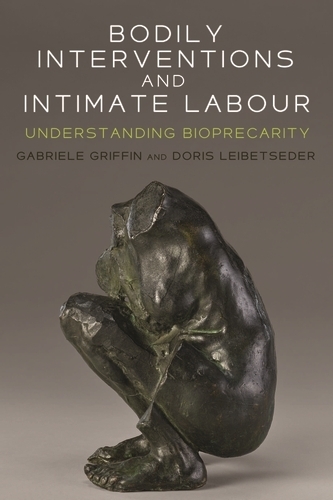
Bodily Interventions and Intimate Labour: Understanding Bioprecarity
(Hardback)
Publishing Details
Bodily Interventions and Intimate Labour: Understanding Bioprecarity
By (Author) Gabriele Griffin
Edited by Doris Leibetseder
Manchester University Press
Manchester University Press
11th February 2020
United Kingdom
Classifications
Tertiary Education
362.1042
Physical Properties
Hardback
280
Width 156mm, Height 234mm
Description
How have rapid changes in biotechnologisation, for example around assisted reproductive technologies or (re)constructive surgery, effected those seeking help with fertility treatment or clitoral reconstruction What is involved for queer people in making a family of their own, or for trans people to access the relevant surgery This volume argues that contemporary cultures foster bioprecarity by categorizing groups of people in certain ways and/or by denying them access to the treatment they seek or need. Drawing on original empirical data with trans and queer people, but also other minoritised and racialized groups, this volume explores how bodily interventions, their regulation, and the intimate labour the interventions involve, create vulnerabilities. -- .
Reviews
'This edited volume from Griffin and Leibetseder (both, Uppsala Univ., Sweden) addresses bioprecarity, both theoretically and practically, in relation to bodies and notions of embodiment. While feminist scholarship has considered bodies for some time, this volume fills a gap in the literature by thematizing precisely how bodies involved in intimate labor are made vulnerable. That is, the volumes contributors address how societal norms and regulations work to require individuals to seek or provide bodily interventions of different kinds. The collection contains 12 chapters organized into 5 parts. Topics considered include kin-making, commercial surrogacy, intimate partner violence, reproductive reconstruction, and histories of medical research as related to indigenous and transgender bodies. Griffin and Leibetseder have given careful attention to the layout of the volume, providing their own opening chapters as an entryway to the text. The book is clearly written and well supported with references. The scholarship is rigorous and links to canonical figures such as Judith Butler and Michel Foucault, as well as many other well-known scholars.'
M. K. Bloodsworth-Lugo, Washington State University
Author Bio
Gabriele Griffin is Professor of Gender Research at Uppsala University
Doris Leibetseder is a Marie Sklodowska-Curie Fellow (2017-2019) at Uppsala University
